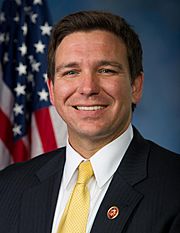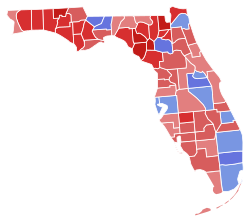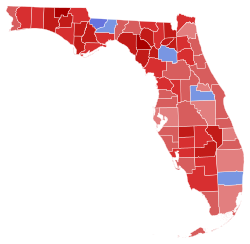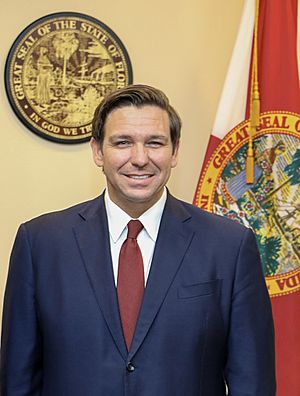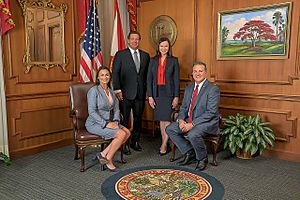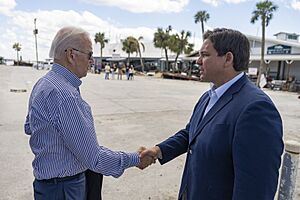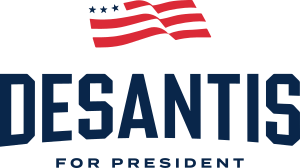Ron DeSantis facts for kids
Quick facts for kids
Ron DeSantis
|
|
|---|---|
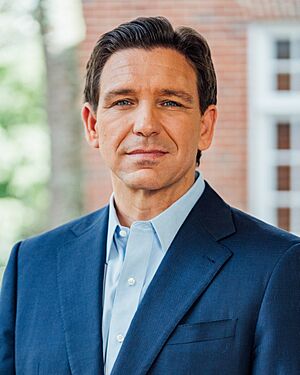
Official portrait, c. 2023
|
|
| 46th Governor of Florida | |
| Assumed office January 8, 2019 |
|
| Lieutenant | Jeanette Nuñez |
| Preceded by | Rick Scott |
| Member of the U.S. House of Representatives from Florida's 6th district |
|
| In office January 3, 2013 – September 10, 2018 |
|
| Preceded by | Cliff Stearns (redistricted) |
| Succeeded by | Mike Waltz |
| Personal details | |
| Born |
Ronald Dion DeSantis
September 14, 1978 Jacksonville, Florida, U.S. |
| Political party | Republican |
| Spouse |
Casey Black
(m. 2009) |
| Children | 3 |
| Education | |
| Signature |  |
| Military service | |
| Branch/service | |
| Years of service | 2004–2010 (active) 2010–2019 (reserve) |
| Rank | Lieutenant Commander |
| Unit | Navy Judge Advocate General's Corps |
| Battles/wars | Iraq War |
| Awards | Bronze Star Navy and Marine Corps Commendation Medal Global War on Terrorism Service Medal Iraq Campaign Medal |
Ronald Dion DeSantis (born September 14, 1978) is an American politician who has served as the 46th Governor of Florida since 2019. Before becoming governor, he was a lawyer and an officer in the U.S. Navy. As a member of the Republican Party, he also served in the U.S. House of Representatives from 2013 to 2018.
DeSantis ran for the Republican nomination for president in 2024. He ended his campaign in January 2024.
After graduating from Yale University and Harvard Law School, DeSantis joined the U.S. Navy in 2004. He worked as a legal advisor for SEAL Team One and was sent to Iraq in 2007. After returning to the U.S., he worked as a special assistant U.S. attorney in Florida until he left active military duty in 2010.
DeSantis was first elected to Congress in 2012. He was a founding member of the Freedom Caucus, a group of conservative members of Congress, and was a supporter of President Donald Trump.
In 2018, DeSantis won the election for governor of Florida, defeating Democratic nominee Andrew Gillum in a very close race. As governor, he has dealt with the COVID-19 pandemic and major storms like Hurricane Ian. He signed into law the Parental Rights in Education Act and the Heartbeat Protection Act. In 2022, he was reelected as governor by a large margin, defeating former governor Charlie Crist.
Contents
Early Life and Schooling
Ronald Dion DeSantis was born on September 14, 1978, in Jacksonville, Florida. His parents, Karen and Ronald, both grew up in the Ohio and Pennsylvania area. His mother was a nurse, and his father installed TV-rating boxes. All of his great-grandparents came to the U.S. from Italy.
His family moved to Dunedin, Florida, when he was six years old. As a child, he played in the 1991 Little League World Series. He went to Dunedin High School and graduated in 1997.
After high school, DeSantis went to Yale University, where he studied history. He was the captain of the Yale baseball team and had the team's best batting average in his senior year. He graduated from Yale with honors in 2001.
He then taught history at a school in Georgia for a year before attending Harvard Law School. He graduated with honors from Harvard in 2005 with a law degree.
In 2004, while still at Harvard, DeSantis became an officer in the U.S. Navy. He was assigned to the Navy's legal department, known as the Judge Advocate General's Corps.
In 2006, he worked at the Guantanamo Bay detention camp. In 2007, he was sent to Iraq as a legal advisor to SEAL Team One. He advised the SEAL Commander in the city of Fallujah.
DeSantis returned to the U.S. in April 2008. He worked as a special assistant U.S. attorney in Florida. He left active duty in February 2010 but remained in the U.S. Navy Reserve until 2019. During his military service, he earned several awards, including the Bronze Star Medal and the Iraq Campaign Medal.
Working in Congress
In 2012, DeSantis ran for the U.S. House of Representatives and won. He was reelected in 2014 and 2016. In Congress, he was known for his conservative views. In 2015, he helped start the Freedom Caucus, a group of conservative lawmakers.
DeSantis opposed new taxes aimed at fighting global warming. He also voted to repeal the Affordable Care Act, a major healthcare law. He was a strong supporter of gun rights and received high ratings from the NRA.
He was critical of President Obama's policies on immigration. He also supported a constitutional amendment to set term limits for members of Congress, meaning they could only serve for a certain number of years.
DeSantis believed the best way to lower the national debt was to cut government spending, not raise taxes. He supported a "no budget, no pay" rule for Congress, which would mean lawmakers wouldn't get paid if they didn't pass a budget.
Running for Governor of Florida
DeSantis was elected governor of Florida in 2018 and reelected in 2022.
2018 Election
In January 2018, DeSantis announced he would run for governor of Florida. President Donald Trump supported his campaign. DeSantis won the Republican primary election in August 2018.
In the general election, he faced the Democratic nominee, Andrew Gillum. The race was very close. After the first count, DeSantis was ahead by a small amount. An automatic recount was done because the results were so close. In the end, DeSantis was declared the winner.
2022 Election
DeSantis ran for reelection in 2022 against Democrat Charlie Crist, a former Florida governor. During the campaign, DeSantis was asked if he would serve a full four-year term if reelected, because many people thought he might run for president in 2024.
DeSantis won the election by a large margin, with 59.4% of the vote. It was the biggest victory in a Florida governor's race in 40 years. He even won in Miami-Dade County, which usually votes for Democrats.
As Governor of Florida
DeSantis became governor on January 8, 2019. Soon after taking office, he officially forgave the Groveland Four, a group of Black men who were wrongly accused of a crime in 1949.
Economy and Taxes
DeSantis has worked to keep taxes low in Florida. In 2019, he signed a $91.1 billion state budget, the largest in Florida's history at the time. In 2021, he signed an even larger budget of $101.5 billion.
During the COVID-19 pandemic, Florida's economy recovered quickly. The state's unemployment rate fell below the national average. In 2023, Florida had a record budget surplus, meaning the state took in more money than it spent.
Education Policies
In 2021, DeSantis supported a ban on teaching critical race theory in Florida's public schools. The Florida Board of Education approved the ban.
In 2022, DeSantis signed the Florida Parental Rights in Education Act. The law stops teachers from discussing sexual orientation or gender identity in classrooms from kindergarten through third grade. In 2023, this rule was expanded to all grades unless it is part of a specific health course.
This law led to a dispute with The Walt Disney Company, which owns Walt Disney World. Disney called for the law to be repealed. In response, DeSantis signed a bill that changed the way Disney's special district in Florida is governed.
Election Laws
After a 2018 amendment restored voting rights to many former felons, DeSantis and the legislature passed a law requiring them to pay all fines and fees before they could vote. This decision was challenged in court but was ultimately upheld.
In 2021, DeSantis supported new rules for voting by mail. These changes included limiting the use of ballot drop boxes and requiring stricter signature matching for mail-in ballots. In 2022, he signed a bill that created a special police unit to investigate election fraud.
COVID-19 Response
DeSantis's handling of the COVID-19 pandemic received mixed reviews. He resisted long-term lockdowns and mask mandates, focusing on keeping the economy open. By 2023, many credited his policies with helping his reelection campaign.
Hurricane Ian Response
In September 2022, Hurricane Ian, a very powerful and deadly storm, hit Florida. DeSantis was widely praised for how the state government responded. He declared a state of emergency early and worked with the federal government, including President Joe Biden, to get aid for the state. He also partnered with Elon Musk to use Starlink satellites to restore internet service in areas hit by the storm.
Campaign for President
For years, many people thought DeSantis would run for president in 2024. After his big reelection win in 2022, this speculation grew.
On May 24, 2023, DeSantis officially announced he was running for the Republican nomination for president. He made the announcement on the social media site X (formerly Twitter) with its owner, Elon Musk. The launch had some technical problems.
DeSantis campaigned for several months. However, on January 21, 2024, after finishing second in the Iowa caucuses, he suspended his campaign. He then endorsed Donald Trump for president.
Family and Personal Life
DeSantis met his wife, Casey Black, on a golf course. She was a TV host and news anchor. They married in 2009 at a chapel in Walt Disney World. They have three children.
DeSantis is a member of the Veterans of Foreign Wars and the American Legion. In 2022, Time magazine named him one of the 100 most influential people in the world.
Electoral history
See also
 In Spanish: Ron DeSantis para niños
In Spanish: Ron DeSantis para niños


